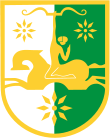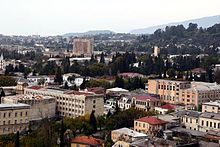- Government of the Autonomous Republic of Abkhazia
-
This article is about the government in exile. For the "de facto" government, see Government of the Republic of Abkhazia.
Autonomous Republic of Abkhazia 

Flag Coat of arms 
Capital Sukhumi (de jure)
Sukhumi (1992–1993)
Tbilisi (1993–2006)
Chkhalta (2006–2008)
Tbilisi (since 2008)Official language(s) Abkhaz, Georgian Government in exile - Chairman,
Cabinet of Ministers
Giorgi Baramia- Chairman, Supreme Council Elguja Gvazava de jure Autonomous republic of Georgia - Georgian independence
from the Soviet Union
Declared
Recognised
April 9, 1991
December 25, 1991Currency Georgian lari ( GEL)The Government of the Autonomous Republic of Abkhazia is an administration recognized by Georgia as the legal government-in-exile of Abkhazia. Abkhazia that has been de facto independent of Georgia – though with very little international recognition – since the early 1990s. This pro-Georgian government maintained a foothold on Abkhazian territory until it was forced into exile by fighting in August 2008. Giorgi Baramia, elected in June 2009, is the current head of the government-in-exile.
After the War in Abkhazia (1992–1993) Georgia proposed five-party talks involving the Government of the Autonomous Republic, the government of the de facto authorities of Abkhazia, and the government of Georgia, along with Russia and the UN as interested parties, in order to settle the final status of Abkhazia within the framework of the Georgian state.[1] The Abkhaz side wanted assurances that Georgia would not try to solve the issue by force of arms before being a party to the talks.
Between September 2006 and July 2008, the Georgian recognized government was headquartered in Upper Abkhazia. However it was forced out of all of Abkhazia in August 2008 during the 2008 South Ossetia War by the Abkhazian armed forces. Upper Abkhazia is a territory that has population of c. 2,000 (1-1.5% of Abkhazia's post-war population) and is centered on the upper Kodori Valley (roughly 17% of the territory of the former Abkhaz ASSR). The government-in-exile is also partly responsible for the affairs of some 250,000 internally displaced persons who were forced to leave Abkhazia following the War in Abkhazia and the ethnic cleansing of Georgians that followed.[2][3]
Contents
History
During the War in Abkhazia, the Government of the Autonomous Republic of Abkhazia, then called the "Council of Ministers of Abkhazia", left Abkhazia after the Abkhaz separatist forces took control of the region’s capital Sukhumi after heavy fighting on September 27, 1993, leading to the Sukhumi Massacre, in which several members of the Abkhazian government of that time, including its chairman Zhiuli Shartava, were executed by the rebels. The Council of Ministers relocated to Georgia’s capital Tbilisi, where it operated as the Government of Abkhazia in exile for almost 13 years. During this period, the Government of Abkhazia in exile, led by Tamaz Nadareishvili, was known for a hard-line stance towards the Abkhaz problem and frequently voiced their opinion that the solution to the conflict can only be attained through Georgia's military response to secessionism. Later, Nadareishvili's administration was implicated in some internal controversies and had not taken an active part in the politics of Abkhazia until a new chairman, Irakli Alasania, was appointed by President of Georgia, Mikheil Saakashvili, his envoy in the peace talks over Abkhazia.
File:Pravit.JPGA House of the Government of Abkhazia in downtown Sukhumi, destroyed in the secessionist offensive on September 27, 1993, still remains in ruins.Amid the 2006 Georgian police operation in Abkhazia's Kodori Gorge, in which a local militia, led by the defiant warlord Emzar Kvitsiani, had been largely disarmed, and the constitutional order restored in the area, President Saakashvili announced, on July 27, 2006, that the authorities had decided to establish the Tbilisi-based Abkhazian government-in-exile in the Kodori Gorge (Upper Abkhazia):
This decision means that for the first time since 1993 the government enters into the midst of Abkhazia, of our Abkhazia, to exercise Georgian jurisdiction and the Georgian constitutional order. This is very important fact and very fundamental political event.[4]
During the 2008 War in Ossetia, the Republic of Abkhazia joined forces with the Ossetians and opened a second front against Georgia. During the Battle of the Kodori Valley Abkhazian forces loyal to the Government of the Republic of Abkhazia pushed the Government of the Autonomous Republic of Abkhazia out of the region of Abkhazia. Sergei Bagapsh, President of the Government of the Republic of Abkhazia said in an address to the Abkhazian people that “the jurisdiction of the Abkhaz state has been restored in the upper Kodori Gorge.”[5]
Heads of the Government
Abkhazia 
This article is part of the series:
Politics and government of
Abkhazia- Government
- President: Alexander Ankvab
- Vice President: Mikhail Logua
- Prime Minister: Leonid Lakerbaia
- People's Assembly
- Speaker: Nugzar Ashuba
- Public Chamber
- Political parties
- Elections
- Presidential: 2009, 2011
- Legislative: 2007
- Local: 2011
- Foreign relations
See also:
- Government of the
Autonomous Republic of Abkhazia - Politics of Georgia
- Tamaz Nadareishvili, September 1993 – March 16, 2004
- Londer Tsaava, March 16, 2004 – September 30, 2004
- Irakli Alasania, September 30, 2004 – April 24, 2006
- Malkhaz Akishbaia, April 24, 2006 – June 11, 2009
- Giorgi Baramia, since June 11, 2009
Executive branch
Main office holders Office Name Party Since Chairman of Cabinet of Ministers Giorgi Baramia June 2009 Chairman of the Supreme Council Elguja Gvazava Abkhazeti June 2009 Deputy of Supreme Council Tamaz Khubua Abkhazeti June 2009 References
- ^ The Resolution of the Parliament of Georgia on the measures of conflict settlement in Abkhazia
- ^ Birgitte Refslund Sørensen, Marc Vincent (2001), Caught Between Borders: Response Strategies of the Internally Displaced, pp. 234-5. Pluto Press, ISBN 0745318185.
- ^ On Ruins of Empire: Ethnicity and Nationalism in the Former Soviet Union Georgiy I. Mirsky, p. 72
- ^ Tbilisi-Based Abkhaz Government Moves to Kodori, Civil Georgia, July 27, 2006. URL accessed on July 28, 2007.
- ^ Sergei Bagapsh announces restoration of control over Kodori Gorge
External links
Governments of Asia Sovereign
states- Afghanistan
- Armenia
- Azerbaijan
- Bahrain
- Bangladesh
- Bhutan
- Brunei
- Burma (Myanmar)
- Cambodia
- People's Republic of China
- Cyprus
- East Timor (Timor-Leste)
- Egypt
- Georgia
- India
- Indonesia
- Iran
- Iraq
- Israel
- Japan
- Jordan
- Kazakhstan
- North Korea
- South Korea
- Kuwait
- Kyrgyzstan
- Laos
- Lebanon
- Malaysia
- Maldives
- Mongolia
- Nepal
- Oman
- Pakistan
- Philippines
- Qatar
- Russia
- Saudi Arabia
- Singapore
- Sri Lanka
- Syria
- Tajikistan
- Thailand
- Turkey
- Turkmenistan
- United Arab Emirates
- Uzbekistan
- Vietnam
- Yemen
States with limited
recognition- Abkhazia
- Nagorno-Karabakh
- Northern Cyprus
- Palestine
- Republic of China (Taiwan)
- South Ossetia
Dependencies and
other territoriesGovernments of Europe Sovereign
states- Albania
- Andorra
- Armenia
- Austria
- Azerbaijan
- Belarus
- Belgium
- Bosnia and Herzegovina
- Bulgaria
- Croatia
- Cyprus
- Czech Republic
- Denmark
- Estonia
- Finland
- France
- Georgia
- Germany
- Greece
- Hungary
- Iceland
- Ireland
- Italy
- Kazakhstan
- Latvia
- Liechtenstein
- Lithuania
- Luxembourg
- Macedonia
- Malta
- Moldova
- Monaco
- Montenegro
- Netherlands
- Norway
- Poland
- Portugal
- Romania
- Russia
- San Marino
- Serbia
- Slovakia
- Slovenia
- Spain
- Sweden
- Switzerland
- Turkey
- Ukraine
- United Kingdom
- (England
- Northern Ireland
- Scotland
- Wales)
- Vatican City
States with limited
recognitionDependencies
and other territories- Åland
- Faroe Islands
- Gibraltar
- Guernsey
- Jan Mayen
- Jersey
- Isle of Man
- Svalbard
Other entities - European Union
 Administrative divisions of Georgia
Administrative divisions of Georgia 
Autonomous Republics Abkhazia · Adjara

Regions City with special status Tbilisi (capital)Categories:- Upper Abkhazia
- Abkhazia
- Government of Georgia (country)
- Independence movements
- Governments in exile
- States and territories established in 1991
- Government
Wikimedia Foundation. 2010.

